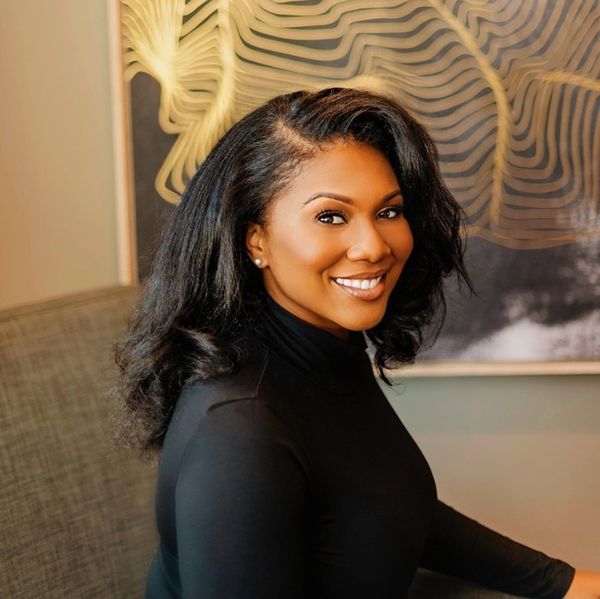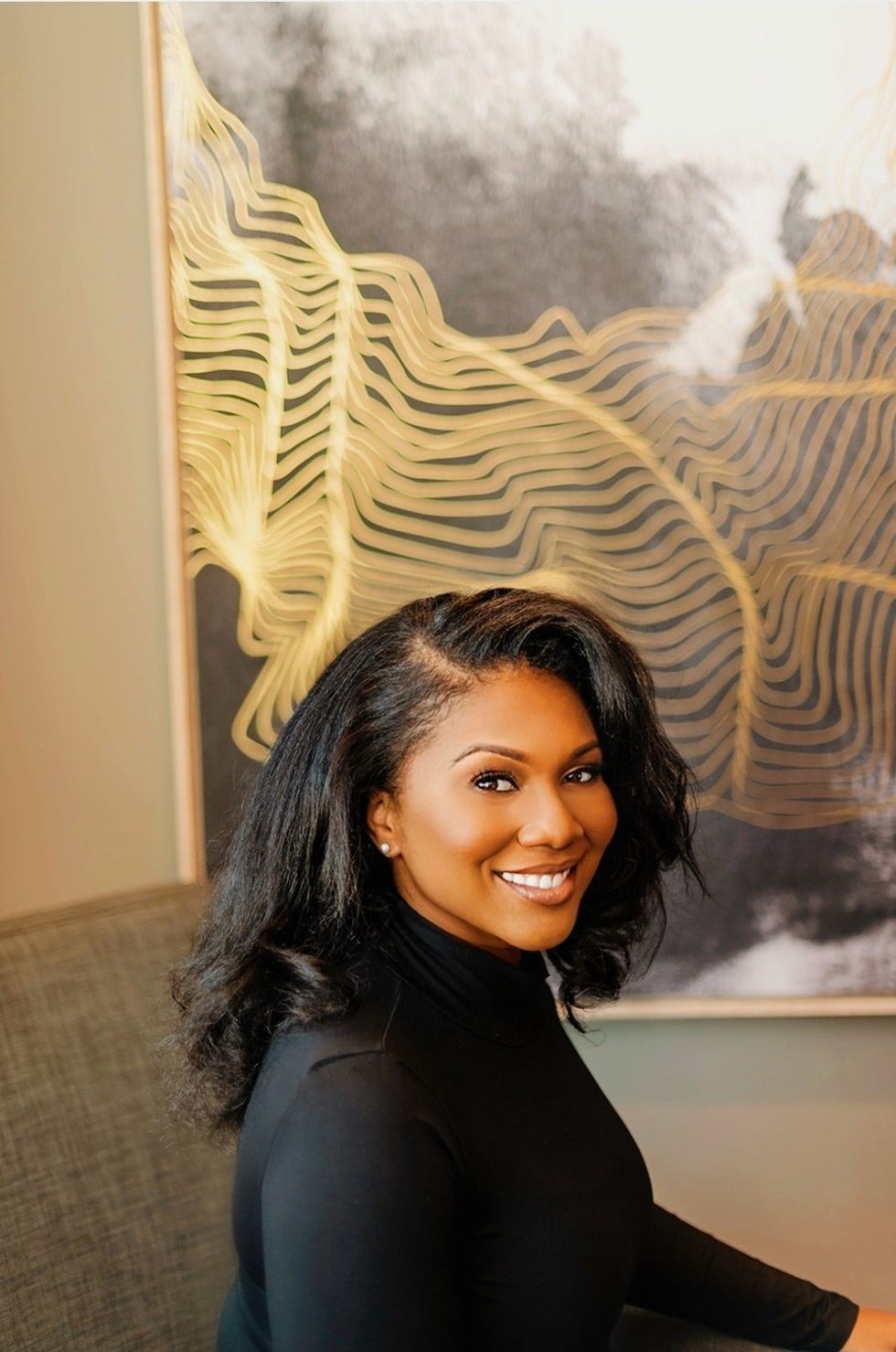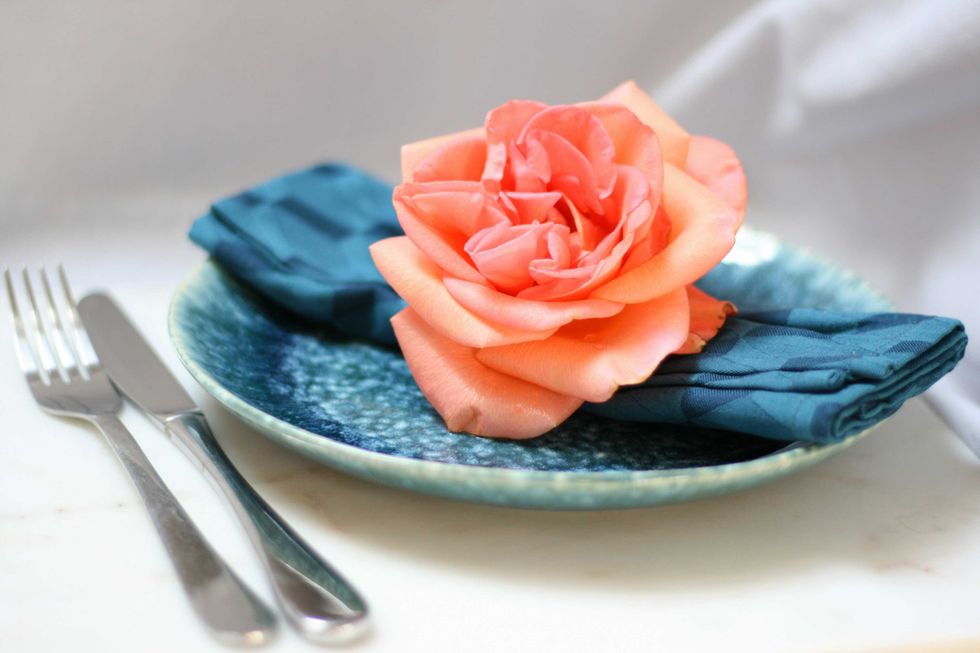Black Women, You Deserve More: How Over-Giving Is Holding You Back In Love & Life

As a Black woman who has been conditioned to over-extend, overgive, and carry the weight of everyone else, I am going to hold your hand when I say this: Putting yourself first is no longer an option, it's the only option, sis.
In a world that demands our self-sacrifice, expects us to bend until we break, and labels us “strong” so we never dare complain or grow weary as we lift others ahead of ourselves, the journey to living authentically and prioritizing our own needs can feel radical. We’re taught to prove our worth through resilience and endurance, but at what cost? Too often, that cost is losing ourselves in roles that don’t truly honor who we are or what we truly need. And that is far too expensive of a cost.
I know this for a fact because a lot of my healing journey has involved unlearning what I learned about love as a child and unpacking the rhetoric around what Black women are expected to be for everyone, even if it's a danger to ourselves. I realized I was tired not because of life or the people around me but because of the things I was passively choosing for myself by not choosing myself.
Living more authentically has meant unlearning the belief that love is earned through over-giving and people-pleasing. It has meant learning how to advocate for myself even in discomfort in order to advocate for my wants and needs instead of settling for less. More than anything, it has also meant learning how to prioritize myself out of self-love and doing so as a daily practice.
Authenticity is not just a buzzword making its rounds on social media. It's a necessity and is arguably one of the most powerful things you can do for self.
That's why this conversation with Samantha Saunders, Licensed Professional Counselor & Authentic Relationship Expert, is so important. The host behind the Moving Beyond You podcast knows firsthand what it means to lose yourself in the pursuit of being enough for others. "When I was in my first marriage, I was so focused on being the ‘perfect wife’ and avoiding the stigma of divorce that I completely lost myself," she shares. "I thought if I just worked harder, sacrificed more, and ignored the red flags—like my husband’s repeated affairs—I could make it work. But all I did was make myself smaller and smaller until I didn’t recognize who I was anymore."
Through her own journey of self-reclamation, Saunders has learned that authenticity isn’t just about being honest with the world, it’s about being honest with yourself. In this interview, she opens up about her path to living an authentic life, her insights into breaking unhealthy relational loops, and how embracing abundance can help you reclaim your narrative and live a life that truly speaks to you.
If you’re ready to shift from over-giving to choosing yourself by living authentically, keep reading.
The Power of Authenticity in Self-Prioritization
For many women, particularly Black women, putting yourself first presents a unique challenge. Between societal expectations and personal obligations, self-prioritization can not only feel uncomfortable but also selfish, a word we've been conditioned to fear. From an early age, we're taught to swallow and shrink ourselves as we shape-shift into whatever the moment calls for. But what happens when those roles consume us to the point that we no longer recognize ourselves, or even disappear?
Like so many of us, Saunders had a similar story. After over 30 years of living according to what society told her she should be, she had a realization: In her pursuit of checking off the "right" boxes (i.e. being married, having kids, staying strong), she had lost herself.
"I didn’t know who I was outside of what other people needed or expected from me," she tells xoNecole. "So when you ask how living authentically plays a role in putting yourself first, the truth is—you can’t fully know yourself without checking in on what you truly want, not just what others say you need."

Samantha Saunders, LPC & Authentic Relationship Expert
Courtesy
Saunders ended up reflecting on a question that would prove to change the trajectory of her life: "If nobody had a say in how I lived my life, not my family, not society, not even my own fears, what would I do?"
For her, the answer was clear. It led her to walk away from a marriage that no longer aligned with her truth and to begin living for herself. While every woman’s answer will be different depending on her season of life, Saunders emphasizes that the core takeaway remains the same: Living authentically requires self-prioritization.
"When you’re not true to yourself, it’s easy to fall into patterns of over-giving, people-pleasing, and settling for less," she explains. "But when you honor who you are and what you truly want, you create space for healthy, reciprocal connections. Relationships should add to your life, not drain it. They thrive when two whole, authentic people show up for each other, and that can only happen when you make yourself a priority."
The truth is, that choosing yourself is an essential part of living authentically. Choosing yourself is not just about bold moves and major life shifts, it's a daily practice. It’s about learning to check in with your needs, set boundaries that honor your well-being, or refuse to shrink yourself for the comfort of others, you are choosing authenticity. You are choosing you.
Signs You’re Stuck in an Unhealthy Relational Loop
Old relational patterns might be the hardest thing to unlearn, even as you start to prioritize yourself more. Though they are often rooted in scarcity, those relational patterns feel familiar and because they are familiar, they become almost like second nature, meaning that without even realizing it, you become stuck in an unhealthy relational loop, a cycle of self-abandonment masquerading as duty, connection, and of course love.
According to Saunders, these loops can show up in ways we don't even question because we view them as normal because they are familiar to us. "Unhealthy relational loops can look like this: You argue, there’s yelling, silent treatment, or someone says something hurtful, and then eventually you 'move on.' Maybe there’s an apology, maybe not, but the behavior doesn’t actually change. You feel like you’re stuck on repeat, and deep down, you know nothing is improving," she explains.
Another major sign? Over-giving or over-functioning in relationships. "Maybe you’re constantly doing things for others at the expense of your own well-being because you’re afraid of disappointing them or losing the relationship. A lot of times in unhealthy relationships we are over-functioning for the other person, whether that’s emotionally or trying to get them to change in some capacity. You might also notice you’re always seeking approval, doubting your decisions, or second-guessing your worth," Saunders expounds.
Other signs of unhealthy relational loops can include:
- Over-explaining or justifying your needs
- Feeling emotionally responsible for others
- Staying in cycles simply because they are familiar
"You are not obligated to keep living in a pattern. You don’t have to keep attracting the same dynamics of giving and just because it’s familiar," Saunders reminds us. "Familiar does not mean safe. Familiar does not mean yours. It just means you have been conditioned to accept it."
"Familiar does not mean safe. Familiar does not mean yours. It just means you have been conditioned to accept it."
Saunders reiterates that familiar patterns are often ones that stem from survival mode, a learned response from our past experiences that we had to earn love or fight to be chosen. But she makes it clear that in case no one told you, "you are no longer that version of yourself who had to fight for scraps. You are becoming a grown healed woman who is allowed to choose abundance, especially in your relationships."
But how do you break a cycle that already feels so ingrained in how you move through the world? Saunders offers a framework for recognizing and releasing these patterns:
How to Heal Unhealthy Relational Patterns: 5 Tips
1. Slow down and see the pattern:
"The moment you feel that familiar pull [of] over-explaining, fixing, shrinking... pause. What is your body telling you? What's the urge? And whose voice is in your head when you feel like you have to do it? Awareness is your first step out."
2. Separate reality from fear.
"A scarcity response is fear dressed up as wisdom. It whispers, 'If I don’t do this, I’ll lose them,' or 'If I say no, they’ll leave.' But is that true, or is it just a version of you that still believes she has to work for love?"
3. Interrupt the cycle with something new.
"When you catch yourself falling into an old pattern, ask yourself: 'What would a healed, abundant version of me do?' Maybe that means not texting first. Maybe that means allowing yourself to receive instead of proving your worth. Maybe that means choosing rest over performing. The shift starts with one different choice."
4. Regulate your nervous system.
"These patterns aren’t just in your mind, they live in your body. That anxious pull to do something? That’s your nervous system running old programming. Breathe. Move. Meditate. Teach your body that you are safe even when you don’t over-function."
5. Rewire your beliefs about love, connection, and worth.
"You have to start believing that you are inherently worthy of love and support not because of what you do, but because of who you are. Real love does not require your exhaustion."
From Scarcity to Abundance: How to Stop Over-Giving and Start Thriving
If learning how to break free from unhealthy relational loops teaches us anything, it’s that we are not obligated to stay in spaces that drain us just because they’re familiar. We don’t have to keep choosing relationships, habits, or beliefs that operate from a place of fear, over-giving, or self-sacrifice. But even when we recognize these cycles, it’s not always easy to stop identifying with them. Why? Because of scarcity.
Scarcity conditions us to believe that letting go of what is familiar means that we are losing. Scarcity makes us believe that if not this, what else is there? What if there is not another opportunity after this, another relationship, another chance? What if there isn't more?
According to Saunders, it's this mindset that keeps us from choosing abundance, from leading a life of authenticity, and ultimately from truly choosing ourselves.
"Scarcity is a mindset we inherit from experiences where we felt like there wasn’t ‘enough.’ Enough love, time, opportunities, or support. It keeps us stuck in fear, thinking we have to cling to what we have because something better might not come along. But the truth is, there are billions of opportunities, people, and chances in this world. Your only limit is what you allow yourself to believe."
So how do you actually make this shift? Saunders offers these key steps:
How to Shift from Scarcity to Abundance: 6 Tips
1. Reframe your beliefs.
"To shift into abundance, start by reframing your beliefs. Instead of thinking, 'This is my only chance,' remind yourself, 'There will always be more.' Whether it’s love, success, or community, abundance exists when you stop operating from fear. 'I have to earn love' or 'Opportunities are limited' must be replaced with 'I am already worthy' and 'What’s meant for me won’t require self-sacrifice.'"
2. Set boundaries that honor your worth.
"Scarcity makes us overextend ourselves because we think saying no means we’re losing something. But boundaries create space for what you truly deserve. Ask yourself, 'Does this add to my life, or does it drain me?' Then make decisions accordingly."
3. Let go of over-giving and practice receiving.
"Practicing receiving without guilt is key, allowing love, help, and rest without immediately feeling the need to reciprocate reinforces that you are deserving just because."
"To shift into abundance, start by reframing your beliefs. Instead of thinking, 'This is my only chance,' remind yourself, 'There will always be more.' Whether it’s love, success, or community, abundance exists when you stop operating from fear."
4. Stop settling and raise your standards.
"Setting and maintaining bare minimum standards in relationships, work, and personal care ensures that you no longer settle for less than what aligns with your worth. The real shift happens when you stop moving from desperation and start moving from trust, knowing that chasing or over-giving won’t bring you what’s truly meant for you."
5. Embrace the power of no.
"Embracing the power of saying no without guilt or fear creates space for what actually nourishes and supports you. When you fully believe in your own worth, you stop proving yourself and start choosing what aligns with the life you truly want.
6. Ground yourself in gratitude.
"Focus on gratitude. When you recognize what you already have, it reinforces the belief that more is possible. Gratitude helps you lean into abundance and lets you move through life with confidence instead of fear."
How to Start Putting Yourself First Today
So, how do you start putting yourself first? Well, it starts with small, intentional choices that reinforce your worth and shift you out of over-giving and self-neglect. In terms of practical tips, Saunders emphasizes prioritizing yourself starts with the little things, like recognizing where your energy is going and reclaiming it.
"Take a look at your schedule, your to-do list, or even your text messages. Identify one thing you’re saying yes to out of guilt, obligation, or fear of disappointing someone, and say no instead," she advises. Whether it’s declining a last-minute request, rescheduling something that doesn’t fit your energy, or stepping away from a draining conversation, setting these small boundaries is a powerful way to take back your time.
Just as important as your actions are the thoughts that shape them. "If you catch yourself thinking, ‘I have to overwork to be successful’ or ‘If I don’t do everything, I’ll lose people,’ pause and reframe it," she encourages. Instead, try replacing those thoughts with, 'Success flows when I take care of myself first' or 'I am worthy of love and support without over-functioning.' This simple mindset shift can completely change how you move through life.
And when it comes to boundaries, one of the most freeing things you can do is stop explaining yourself. "You don’t need to justify prioritizing yourself. A simple ‘I’m not available’ is enough," Saunders reminds us. "Watch how much lighter you feel when you stop giving people permission to validate your choices." Letting go of the need for permission or validation allows you to stand firmly in your decisions without guilt.
4 Ways to Put Yourself First Without Feeling Guilty
For Black women, self-prioritization is more than self-care, it’s self-preservation. This radical act of choosing ourselves is about reclaiming our time, our energy, and our wholeness. But just because we are learning that pouring endlessly into others leads to our own unraveling doesn’t mean there isn’t room to prioritize the people we love. It simply means we can no longer afford to do so at the cost of losing ourselves in the process.
"Balancing self-prioritization while nurturing healthy relationships starts with the understanding that putting yourself first doesn’t mean neglecting others—it means making sure you’re showing up fully, not resentfully," says Saunders. "This will include setting boundaries, communicating clearly, and ensuring that your relationships are built on mutual respect, not self-sacrifice."
The truth is, that healthy relationships don’t require self-abandonment. They don’t thrive on exhaustion or performance. They require both individuals to show up fully and authentically. And prioritizing yourself does not mean neglecting others. It means making sure you are included in the love and care you so freely give.
It means no longer depleting yourself in relationships just to be seen as worthy. "Many people, especially Black women, have been conditioned to believe that prioritizing themselves means neglecting others, but in reality, when you care for yourself first, you show up in relationships from a place of fullness, not depletion."
So how do you balance both? How do you nurture your relationships while making sure you don’t disappear in the process? Saunders shares the following key steps:
1. Get Clear on Your Non-Negotiables
"What do you need to feel like you? Whether it’s alone time, a morning routine, therapy, or simply not answering calls after a certain time, those things matter. When you make space for them, you show up in relationships from a place of wholeness, not depletion."
2. Set Boundaries & Communicate Them Early
"Healthy relationships thrive on clear expectations. If you need a night to yourself, say it. If a conversation is draining you, step away. Boundaries aren’t walls; they’re guidelines for how you can love and be loved without losing yourself in the process."
3. Check in With Yourself Regularly
"We check in on others all the time—How are you? But how often do you ask yourself that? Take a moment each week to pause and ask: Am I honoring my needs, or am I slipping into over-giving? Your well-being shouldn’t be an afterthought."
4. Release the Guilt
"You don’t have to prove your love by over-sacrificing. The people who genuinely care about you will respect your need for balance. Love should feel mutual, reciprocal, and energizing not something that drains the life out of you.
"At the end of the day, the healthier you are mentally, emotionally, [and] physically the healthier your relationships will be. You don’t have to choose between taking care of yourself and being there for others. You can do both. The key is making sure you don’t disappear in the process.
"So ask yourself: 'Am I showing up from a place of love, or from a place of obligation?' The answer will tell you everything you need to know," Saunders concludes.
For more of Saunders, cop her 7 Days to Reclaim Your Peace and Start Healing journal here.
Let’s make things inbox official! Sign up for the xoNecole newsletter for love, wellness, career, and exclusive content delivered straight to your inbox.
Featured image courtesy
Because We Are Still IT, Girl: It Girl 100 Returns
Last year, when our xoNecole team dropped our inaugural It Girl 100 honoree list, the world felt, ahem, a bit brighter.
It was March 2024, and we still had a Black woman as the Vice President of the United States. DEI rollbacks weren’t being tossed around like confetti. And more than 300,000 Black women were still gainfully employed in the workforce.
Though that was just nineteen months ago, things were different. Perhaps the world then felt more receptive to our light as Black women.
At the time, we launched It Girl 100 to spotlight the huge motion we were making as dope, GenZennial Black women leaving our mark on culture. The girls were on the rise, flourishing, drinking their water, minding their business, leading companies, and learning to do it all softly, in rest. We wanted to celebrate that momentum—because we love that for us.
So, we handpicked one hundred It Girls who embody that palpable It Factor moving through us as young Black women, the kind of motion lighting up the world both IRL and across the internet.
It Girl 100 became xoNecole’s most successful program, with the hashtag organically reaching more than forty million impressions on Instagram in just twenty-four hours. Yes, it caught on like wildfire because we celebrated some of the most brilliant and influential GenZennial women of color setting trends and shaping culture. But more than that, it resonated because the women we celebrated felt seen.
Many were already known in their industries for keeping this generation fly and lit, but rarely received recognition or flowers. It Girl 100 became a safe space to be uplifted, and for us as Black women to bask in what felt like an era of our brilliance, beauty, and boundless influence on full display.
And then, almost overnight, it was as if the rug was pulled from under us as Black women, as the It Girls of the world.
Our much-needed, much-deserved season of ease and soft living quickly metamorphosed into a time of self-preservation and survival. Our motion and economic progression seemed strategically slowed, our light under siege.
The air feels heavier now. The headlines colder. Our Black girl magic is being picked apart and politicized for simply existing.
With that climate shift, as we prepare to launch our second annual It Girl 100 honoree list, our team has had to dig deep on the purpose and intention behind this year’s list. Knowing the spirit of It Girl 100 is about motion, sauce, strides, and progression, how do we celebrate amid uncertainty and collective grief when the juice feels like it is being squeezed out of us?
As we wrestled with that question, we were reminded that this tension isn’t new. Black women have always had to find joy in the midst of struggle, to create light even in the darkest corners. We have carried the weight of scrutiny for generations, expected to be strong, to serve, to smile through the sting. But this moment feels different. It feels deeply personal.
We are living at the intersection of liberation and backlash. We are learning to take off our capes, to say no when we are tired, to embrace softness without apology.
And somehow, the world has found new ways to punish us for it.

In lifestyle, women like Kayla Nicole and Ayesha Curry have been ridiculed for daring to choose themselves. Tracee Ellis Ross was labeled bitter for speaking her truth about love. Meghan Markle, still, cannot breathe without critique.
In politics, Kamala Harris, Letitia James, and Jasmine Crockett are dragged through the mud for standing tall in rooms not built for them.
In sports, Angel Reese, Coco Gauff, and Taylor Townsend have been reminded that even excellence will not shield you from racism or judgment.

In business, visionaries like Diarrha N’Diaye-Mbaye and Melissa Butler are fighting to keep their dreams alive in an economy that too often forgets us first.
Even our icons, Beyoncé, Serena, and SZA, have faced criticism simply for evolving beyond the boxes society tried to keep them in.
From everyday women to cultural phenoms, the pattern is the same. Our light is being tested.

And yet, somehow, through it all, we are still showing up as that girl, and that deserves to be celebrated.
Because while the world debates our worth, we keep raising our value. And that proof is all around us.
This year alone, Naomi Osaka returned from motherhood and mental health challenges to reach the semifinals of the US Open. A’ja Wilson claimed another MVP, reminding us that beauty and dominance can coexist. Brandy and Monica are snatching our edges on tour. Kahlana Barfield Brown sold out her new line in the face of a retailer that had been canceled. And Melissa Butler’s company, The Lip Bar, is projecting a forty percent surge in sales.

We are no longer defining strength by how much pain we can endure. We are defining it by the unbreakable light we continue to radiate.
We are the women walking our daily steps and also continuing to run solid businesses. We are growing in love, taking solo trips, laughing until it hurts, raising babies and ideas, drinking our green juice, and praying our peace back into existence.
We are rediscovering the joy of rest and realizing that softness is not weakness, it is strategy.
And through it all, we continue to lift one another. Emma Grede is creating seats at the table. Valeisha Butterfield has started a fund for jobless Black women. Arian Simone is leading in media with fearless conviction. We are pouring into each other in ways the world rarely sees but always feels.

So yes, we are in the midst of societal warfare. Yes, we are being tested. Yes, we are facing economic strain, political targeting, and public scrutiny. But even war cannot dim a light that is divinely ours.
And we are still shining.
And we are still softening.
And we are still creating.
And we are still It.

That is the quiet magic of Black womanhood, our ability to hold both truth and triumph in the same breath, to say yes, and to life’s contradictions.
It is no coincidence that this year, as SheaMoisture embraces the message “Yes, And,” they stand beside us as partners in celebrating this class of It Girls. Because that phrase, those two simple words, capture the very essence of this moment.
Yes, we are tired. And we are still rising.
Yes, we are questioned. And we are the answer.
Yes, we are bruised. And we are still beautiful.

This year’s It Girl 100 is more than a list. It is a love letter to every Black woman who dares to live out loud in a world that would rather she whisper. This year’s class is living proof of “Yes, And,” women who are finding ways to thrive and to heal, to build and to rest, to lead and to love, all at once.
It is proof that our joy is not naive, our success not accidental. It is the reminder that our light has never needed permission.
So without further ado, we celebrate the It Girl 100 Class of 2025–2026.
We celebrate the millions of us who keep doing it with grace, grit, and glory.
Because despite it all, we still shine.
Because we are still her.
Because we are still IT, girl.
Meet all 100 women shaping culture in the It Girl 100 Class of 2025. View the complete list of honorees here.
Featured image by xoStaff
Give Thanks: 10 Tips For Hosting An Absolutely Awesome Friendsgiving
If you’ve never checked out an episode of the ReLiving Single Podcast featuring Maxine and Synclaire — oops, I mean Erika Alexander and Kim Coles — it’s worth listening to an episode or two; especially if you’re someone like me who watches the Living Single reruns on TV One, sometimes, like they just came out. Good times.
And what does this even remotely have to do with Friendsgiving? Well, if you ever wondered what the origin story of this non-holiday-holiday is, legend has it that it’s mostly due to the combination of a 2007 tweet and the show that tries to act like it wasn’t birthed out of Living Single: Friends (I’m not the only one who feels this way either; you can read more about all of that here, here and here).
Apparently, there was a Thanksgiving episode that featured all of the friends having dinner together. And y’all, there was simply no way that I was going to mention the latter without shouting out the original (amen?).
Okay, so with that out of the way — Friendsgiving. Something that I appreciate about twists to holidays like this is that it’s a reminder that there is no one way to celebrate special occasions. And so, if, for whatever the reason, you will not or cannot be with family during the holiday season, there are certainly other alternatives at your disposal.
That being said, if the thought of spending time with friends this Thanksgiving is something that you’d like to do, yet you’re not sure how to host it in a way that will make Friendsgiving a fan favorite for your entire circle — I’ve got 10 suggestions that can make the planning process easy as pumpkin (or sweet potato) pie.
1. Position Chrysanthemums or Orchids for Your Table Décor

Unsplash
Let’s start with décor first. Listen, aside from cleaning up your place, you don’t have to be over the top. If you put together a really nice centerpiece or put a flower at each table setting, honestly, you’re all good. And if you’re someone who is big on details and symbolism, my recommendation would be to go with some chrysanthemums and/or orchids.
When it comes to chrysanthemums, not only are they a peak fall flower, they represent things like friendship and happiness. And orchids? They tend to bloom during the fall and spring seasons and, not only are they about luxury, certain orchid colors also symbolize friendship (for the record, yellow roses symbolize friendship too). Perfect.
2. Incorporate Scents That Cultivate Gratitude
Speaking of cultivating a warm and inviting space, you can never go wrong with scented soy candles — or at least having an essential oil diffuser in a few spots. Some scents that actually help to bring in the spirit of gratitude include vanilla, jasmine, ginger, cedarwood and frankincense.
3. Use Upscale Paper Products to Dine With

Unsplash
Let’s be real — a lot more of us would probably host events in our home if it wasn’t for the mess that is left behind in our kitchen once the festivities are over. Wanna avoid that? Use paper plates. No, I don’t mean the cheap Styrofoam ones. SMDH. These days, there are paper (and plastic) plate brands that will low-key blow your mind when it comes to how bougie they look. Some that are worth considering are located here, here and here.
4. Handwrite Thank-You Notes (Use Them As Place Settings)
If you’re like Tiffany (from the HBO series Insecure — what a time) was at that memorable dinner party when all hell broke loose between Lawrence and Issa and you’re pretty anal — I mean, particular — LOL — about place settings, it’s a nice touch to pick up some blank thank-you cards that you can write a personalized “I’m thankful for you because…” message in. Place each one where you’d like each friend to sit. They won’t see it coming and it’s a really nice touch.
5. Have Everyone Bring Their Favorite Homemade Dish

Unsplash
Okay, and what if what has you on the fence about hosting is you don’t feel like doing a ton of cooking? Chile, this is where the concept of having a potluck comes in. Get everyone to bring the dish that they claim they cook the best and make sure to let them know how many individuals you plan on coming (so that they will make enough). You can even make a game out of it by having everyone anonymously vote for the first, second and third best dishes out of the bunch. Take it up a notch by having a prize for each winner.
6. Take a Warm Drink and Dessert Poll Beforehand
You know what isn’t discussed enough about dinner parties? Folks bringing desserts that other people don’t even like. SMDH. You can avoid this from becoming an issue at your Friendsgiving by sending an email (most people prefer that to group chats; let’s be real — and make sure to BCC everyone as well) asking everyone to share what their top three favorite desserts and warm drinks are. Then pick the top 2-3 out of the bunch. That way, you won’t have a ton of (for instance) coffee cake or apple cider lying around that no one even wanted in the first place.
7. Create a Signature Friendsgiving Mocktail and Cocktail

Unsplash
Speaking of drinks, another way to make your Friendsgiving memorable is to come up with a signature mocktail (for those who don’t consume alcohol) and cocktail. For the mocktail, you can also poll your friends about their favorite mocktail or fruits and come up with a mixture of your own. For the cocktail — although National Friendship Day is actually in August, I did peep that there are certain drinks that have been created in its honor. Some of them are located here for you to do a bit of tweaking on (if you’d like).
8. Ask Everyone to Share Their “Favorite Friend Quality” of Another
You know how it’s customary for everyone to go around and share what they are truly thankful for before having dinner? Well, to continue along with the Friendsgiving theme, have each person share what their favorite friend quality is about the person to their right. If folks are just meeting each other for the first time, instead they can share what they value the most in friendship overall, along with a story of how it was displayed to them personally over the past 12 months.
9. Send Each of Your Guests Home with a Fresh Gratitude Journal

Unsplash
Wanna send folks home with a nice parting gift? It would be so on-trend to give each of them a gratitude journal. Listen, we are in some crazy times right through here (at least in the States) and so, encouraging your friends to set some time aside, regularly, to think about and then outwardly express what they are grateful for? That helps to keep stress down, keep things in perspective and it reminds us all to maintain a positive mindset as much as possible.
10. Watch a Nostalgic Movie
While everyone is enjoying dessert and drinks, how about watching a movie that brings back fond memories? A list of some of the most popular movies to come out previous Thanksgiving weekends is located here and a list of some favorite Black holiday-themed films can be found here. It’s a way to wind down and share some laughs before everyone heads home.
___
Friendsgiving. What a wonderful way to celebrate your friends while also observing Thanksgiving in a way that is totally on your terms. And now that you know how to put it together, what are you waiting for? Hit your friends up and let them know that, whether it’s on actual Thanksgiving Day or a few days before or after, you’ve got a special dinner in mind.
One that has a good time with amazing friends written ALL over it.
Let’s make things inbox official! Sign up for the xoNecole newsletter for love, wellness, career, and exclusive content delivered straight to your inbox.
Featured image by PeopleImages/Shutterstock









